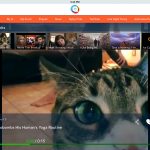HTC One M8 arrives in more stores

Well, hell, someone pinch me and tell me this is April 11th; my calendar says the 10th. Because HTC sent BetaNews email (and tweeted) that the One M8 is available now. I called several AT&T stores, which confirmed sales starting today; Sprint also. T-Mobile launches tomorrow, however. So that tweet isn't quite what it seems: "See it, touch it, believe it. The new HTC One (M8) has landed at retailers nationwide".
Verizon got an early lead, on March 25th. According to HTC, The One "is hitting store shelves at the other U.S. operators today. Customers of all major U.S. operators will now be able to walk into stores and pick-up the HTC One (M8) starting at just $199". That's true for some carriers, but not all. If you're on T-Mobile and willing to wait, The One will be zero dollars down and monthly payments spread over 24 months.
Will you buy HTC One M8?

In light of Brian Fagioli's review and Friday's official launch, time comes to ask whether or not you will buy HTC's newest flagship, the M8. The name takes away from powerful connotations that HTC One carries. But maybe there is something to M-eight (you know, Mate). Henceforth, I will refer to this magnificent smartphone as The One. For many of you, it will be.
Brian isn't the only BetaNewser testing The One. I have the T-Mobile variant, which unlike his Verizon model carries no carrier branding. Thank you, Pink! Or is that Magenta? Beauty and the Beast is applicable moniker. The smartphone delights the eyes but challenges the hands, because it is so big. Largely the blame belongs to one of the biggest benefits: The front-facing speakers. For comparison, and I kid you not: The entire length of iPhone 5s is about the same as the length of the HTC smartphone's screen. Right, just the display. The One measures 146.36 x 70.6 x 9.35 mm compared to the Apple's 123.8 x 58.6 x 7.6 mm.
Hello, Chromebook!

Today Mihaita Bamburic bids "Goodbye, Windows XP!" Meanwhile, Wayne Williams walks down eXPerience memory lane. For good reason: This week, Microsoft pulls the life support plug -- following many, many, many delays. Henceforth, you use XP at your own risk, or forcibly march forward into the second decade of the 21st Century. You could follow Microsoft to Windows 8.1, or be truly courageous. Mac or Linux laptop are options, or you could go Chromebook. Yeah, you read right.
Here in the United States, Best Buy will trade in your XP clunker and give "minimum of $100 toward the purchase of a new Windows computer, Apple computer or Chromebook". The offer ends April 19, so hurry. The cash back will practically pay for a new Chromebook, which costs so little and does so much -- surely more than your XP wheezer. Someone from the Windows division once told me that O2, as in Oxygen, was one of the runner-up names for XP. How fitting. Your old machine has been living off oxygen for far too long. Pull the plug. I'll give you some reasons why Chromebook.
I gave up the Ghost

I spent time with the Ghost blogging platform today. I am intrigued by the visuals and promised simplicity. But I don't see the latter. At this stage, I just see complexity. Yet the whole premise is stripping back to basic blogging, rather than managing content as WordPress increasingly demands.
This month I put up a website for my personal independent publishing brand, and there are few posts, making it a good test case for migration. I easily used the WordPress plugin for exporting posts in Ghost format and imported them just fine. But I see too much trouble adapting themes, most of which look fabulous, BTW, or prepping other basic features.
iTunes Match made in heaven, ah, the cloud

Overnight Monday, I explained how "iTunes slaps DRM handcuffs on my music". Later that day, an Apple representative proactively contacted me seeking to resolve the problem. Someone still reads what I write. That started a process that mostly removed rights protection from my music and identifies several iTunes Match benefits not necessarily obvious but useful to most any Apple music buyer.
Recap: In October 2007, I declared DRM freedom and removed all rights-protected tracks from my library. For some unidentified reason, on Sunday, iTunes presented me with option to fetch from the cloud these previously purchased but deleted songs. Downloading retrieved the long-absent music in the original 128kbps protected-AAC format, not the newer, 256kbps DRM-free files. Now I know why.
iTunes slaps DRM handcuffs on my music

On Sunday, while perusing my music collection by album, I came across lots of new -- or rather, old and forgotten -- tracks purchased before Apple took iTunes DRM-free. My excitement at discovering, and downloading from the cloud, these long lost songs cannot be understated. That is until finding them not to be what I expected. Rather than crisp, 256kbps DRM-free files, iTunes delivered 128kbps protected-AAC tracks. What the frak? Apple is supposed be done with digital rights management for music.
That iTunes Match provides access to this older music, even if DRM-protected, is a benefit. Thank you, Apple, for providing an affordable means for recovering lost or deleted music. What confuses me: Being given the older, lower-quality, locked files when higher-bitrate DRM-free alternatives are available from Apple's store. I don't have an answer why this morning, but I do have some suspicions. Perhaps you're smarter than me or better at finding solutions in online support forums.
Yeah, let's 'band' Fagioli from BetaNews

Reader reaction to Brian Fagioli post "Sorry Netflix, but you should pay 'tolls' to ISPs" is quite dramatic. Three-hundred-thirty comments later, some of you demand his head. There is even petition "Band Brian Fagioli from Beta News", in response to the post. I assume the petition creator means "ban" but band is good enough for me. Brian is one of the group.
The story requires no editorial response but I give one anyway. Earlier, a reader emailed that he is done with BetaNews. I think my reply to him will benefit other readers, so I share it, slipping in some additional commentary. I hope this answer will illuminate our editorial policies.
Netflix, please stop telling me what to watch

Netflix and I go way back -- to February 1999, when renting my first-ever DVD. I am a streaming customer now and increasingly dissatisfied. Netflix is the overly friendly store clerk -- the kind you never find in retail -- persistently making suggestions for stuff I wouldn't ever want. "Excuse me, because you bought toilet paper last time, lookee here! Beano gas-relief pills and Febreze air freshener are on sale this week". Yeah, right. Let me soak your hoity-toity head in the toidy bowl, bud.
Online retailers like Netflix (yeah, you too, Amazon) attempt to improve service by tracking what you consume and helpfully suggesting something like it. Last decade, analysts labeled the process "personalization". But they frequently invent or change labels to sell new services, and I don't rightly know what the thing is called now. I call it goddamn annoying and limiting. The more I watch, the less often compelling content comes my way.
How I write about Chromebook
Over the weekend, I got email from developer Jeff Nelson referencing his blog response to my BetaNews story: "Chromebook belongs to computing's past, not its future". He is among a majority of responders who disagree with my assessments about the future of PCs depending on keyboard and mouse.
Today's Android Wear platform announcement foreshadows exactly where computing is headed. For longer perspective, please see my book The Principles of Disruptive Design. But suffice to say that Google champions "Star Trek"-like computing, where you—by sight, sound, touch, and voice—are the user interface.
Google Drive price cut gives a little and takes a lot

This week, World Wide Web inventor Tim Berners-Lee calls for a "bill of rights" for the Internet. Much of the media coverage focuses on governments, but I see corporations as greater concerns. Who has more direct access to your stuff? Google is front and center, but by no means alone, profiting from your content.
Today's big Google Drive price cut -- $1.99 and $9.99 monthly down from $4.99 and $49.99 for 100GB and 1TB, respectively -- makes me wonder. The search and information giant offers more value for less money. The question: Who benefits more? Customers paying less, or Google getting their business? I have to wonder when, if not already, the company will use contextual data gathered from your Drive for targeted everything, from Now to ads and more.
Hey, Amazon, reward Kindle Fire owners with lower Prime pricing

Catalog this post in the "Stories I meant to Write Dept." On February 1, when rumors circulated about Amazon price increases, I conveyed to colleague Alan Buckingham in chat: "If I were Amazon, Prime would stay same for Fire users but go up for everyone else. Reward customers and drive sales". Today's price increase announcement is reason to formally suggest what I should have six weeks ago.
Amazon tablet shipments dipped during fourth quarter -- from 5.9 million to 5.8 million units -- year over year, according to IDC. Global market share fell to 7.6 percent from 9.9 percent. The other top-5 manufacturers all posted healthy growth gains, although Apple also lost market share. Amazon should use lower Prime pricing to encourage new Kindle Fire sales and to reward existing owners. Keep the price $79 for these customers and hike the rest to $99. To be clear: Referring to Kindle Fire means all models, including HD and HDX.
Qplay is the Devil in my living room

So I received Qplay last week, but only set up the thing today. Definitely I won't ever spend cash on preview programs again. Mother of God. Sweet Jesus. Someone save me from the choppy performance controlling the streaming box from iPad Air.
Did these guys grow up before multitasking? If I'm watching a video and want to scan the thumbnail strip for something else, Holy Moly, the vid stops and waits for me to tap the next thing.
Chromebook belongs to computing's past, not its future
Early this evening, I exchanged emails with someone writing a blog post about Chromebook. He seeks sales numbers that I doubt are available. Success is a difficult measure despite the hype. In January post "The trouble with new Chromebooks" here and "Twenty-Fourteen isn't Year of the Chromebook" on my personal site, I raise questions about the computer's future.
I extend reservations in the text of my email reply, which follows.
Why Chromebook is good for students

Today, at ZDNET, James Kendrick's commentary "Chromebooks and students: Long term trouble for Microsoft" adds to a growing meme. With a few schools deploying Chromebooks (emphasis few) and rumors Microsoft has slashed Windows licensing fees (remember unconfirmed), recurring theme "2014 is year of the Chromebook and Windows is in deep dodo because of it" isn't surprising. But just because bloggers say something's true often enough, doesn't make it that way. Twenty fourteen isn't year of the Chromebook, nor is its utility to the education market guaranteed.
That said, Kendrick makes some good points about why Chromebook appeals to students. I won't recap them. This isn't an aggregated synopsis. You can read his fine points. My post adds to them, from experience. I am a long-time Chromebook user.
Apple shouldn't be the next Microsoft

In a long, thoughtful post today, Mark Rogowsky writes for Forbes: "No, Apple Is Not Like Microsoft". He responds to arguments put forth by Barclays analyst Ben Reitzes, which Steven Russolillo summarizes in Wall Street Journal post "Four Reasons Apple is the New Microsoft".
I disagree with the original argument and its rebuttal. I encourage you to read both posts. The answer to why one stock soars while another sunders has little to do with market caps, P/E ratios, and other math metrics analysts crunch like gerbils with a new stick. People generally make decisions for emotional reasons -- what feels right to them. As I so often say, in business perception is everything.
Joe's Bio
Joe Wilcox is BetaNews executive editor. His motto: Change the rules. Joe is a former CNET News staff writer, JupiterResearch senior analyst, and Ziff Davis Enterprise Microsoft Watch editor.
Ethics StatementBetaNews, your source for breaking tech news, reviews, and in-depth reporting since 1998.
© 1998-2025 BetaNews, Inc. All Rights Reserved. About Us - Privacy Policy - Cookie Policy - Sitemap.
